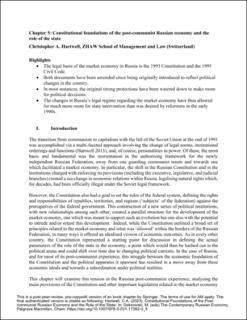Bitte benutzen Sie diese Kennung, um auf die Ressource zu verweisen:
https://doi.org/10.21256/zhaw-27787| Publikationstyp: | Buchbeitrag |
| Art der Begutachtung: | Editorial review |
| Titel: | Constitutional foundations of the post-communist Russian economy and the role of the state |
| Autor/-in: | Hartwell, Christopher A. |
| et. al: | No |
| DOI: | 10.1007/978-3-031-17382-0_5 10.21256/zhaw-27787 |
| Erschienen in: | The contemporary Russian economy : a comprehensive analysis |
| Herausgeber/-in des übergeordneten Werkes: | Dabrowski, Marek |
| Seite(n): | 81 |
| Seiten bis: | 98 |
| Erscheinungsdatum: | 2023 |
| Verlag / Hrsg. Institution: | Palgrave Macmillan |
| Verlag / Hrsg. Institution: | Cham |
| ISBN: | 978-3-031-17381-3 978-3-031-17382-0 |
| Sprache: | Englisch |
| Schlagwörter: | Russland; Kommunismus; Kapitalismus; Staat; Wirtschaft; Politik |
| Fachgebiet (DDC): | 320: Politik 330: Wirtschaft |
| Zusammenfassung: | The transition from communism to capitalism with the fall of the Soviet Union at the end of 1991 was accomplished via a multi-faceted approach involving the change of legal norms, institutional orderings and functions (Hartwell, 2013), and, of course, personalities in power. Of these, the most basic and fundamental was the reorientation in the authorising framework for the newly independent Russian Federation, away from one guarding communist tenets and towards one which facilitated a market economy. In particular, the shift in the Russian Constitution and in the institutions charged with enforcing its provisions (including the executive, legislative, and judicial branches) created a sea change in economic relations within Russia, legalising natural rights which, for decades, had been officially illegal under the Soviet legal framework. However, the Constitution also had a goal to set the rules of the federal system, defining the rights and responsibilities of republics, territories, and regions (federal entities) against the prerogatives of the federal government. This construction of a new series of political institutions, with new relationships among each other, created a parallel structure for the development of the market economy, one which was meant to support such an evolution but one also with the potential to intrude and/or retard this development. Indeed, while the Constitution outlined a broad set of principles related to the market economy and what was ‘allowed’ within the borders of the Russian Federation, in many ways it offered an idealised version of economic outcomes. As in every other country, the Constitution represented a starting point for discussion in defining the actual parameters of the role of the state in the economy, a point which would then be hashed out in the political arena and could shift over time due to changing political currents. In the case of Russia, and for most of its post-communist experience, this struggle between the economic foundation of the Constitution and the political apparatus it spawned has resulted in a move away from these economic ideals and towards a subordination under political realities. This chapter will examine this tension in the Russian post-communist experience, analysing the main provisions of the Constitution and other important legislation related to the market economy (such as the Civil Code) that determine the shape of the economic system in Russia and how it affects its implementation in practice. Specifically, we will focus on the role of the state as envisioned in the legal framework of Russia and how this has evolved since the Russian Federation became independent at the end of 1991. Which is a more accurate representation of the extent of state involvement in the Russian economy: is it the Constitution? Is it the supporting legislation and the institutional structure that the Constitution laid out? Or has it been the political imperatives of the Russian government and the personalities which have been in charge? |
| URI: | https://digitalcollection.zhaw.ch/handle/11475/27787 |
| Volltext Version: | Akzeptierte Version |
| Lizenz (gemäss Verlagsvertrag): | Lizenz gemäss Verlagsvertrag |
| Departement: | School of Management and Law |
| Organisationseinheit: | International Management Institute (IMI) |
| Enthalten in den Sammlungen: | Publikationen School of Management and Law |
Dateien zu dieser Ressource:
| Datei | Beschreibung | Größe | Format | |
|---|---|---|---|---|
| 2022_Hartwell_Constitutional-foundations-of-the-post-communist-Russian-economy_AAM.pdf | Accepted Version | 321.26 kB | Adobe PDF |  Öffnen/Anzeigen |
Zur Langanzeige
Hartwell, C. A. (2023). Constitutional foundations of the post-communist Russian economy and the role of the state. In M. Dabrowski (Ed.), The contemporary Russian economy : a comprehensive analysis (pp. 81–98). Palgrave Macmillan. https://doi.org/10.1007/978-3-031-17382-0_5
Hartwell, C.A. (2023) ‘Constitutional foundations of the post-communist Russian economy and the role of the state’, in M. Dabrowski (ed.) The contemporary Russian economy : a comprehensive analysis. Cham: Palgrave Macmillan, pp. 81–98. Available at: https://doi.org/10.1007/978-3-031-17382-0_5.
C. A. Hartwell, “Constitutional foundations of the post-communist Russian economy and the role of the state,” in The contemporary Russian economy : a comprehensive analysis, M. Dabrowski, Ed. Cham: Palgrave Macmillan, 2023, pp. 81–98. doi: 10.1007/978-3-031-17382-0_5.
HARTWELL, Christopher A., 2023. Constitutional foundations of the post-communist Russian economy and the role of the state. In: Marek DABROWSKI (Hrsg.), The contemporary Russian economy : a comprehensive analysis. Cham: Palgrave Macmillan. S. 81–98. ISBN 978-3-031-17381-3
Hartwell, Christopher A. 2023. “Constitutional Foundations of the Post-Communist Russian Economy and the Role of the State.” In The Contemporary Russian Economy : A Comprehensive Analysis, edited by Marek Dabrowski, 81–98. Cham: Palgrave Macmillan. https://doi.org/10.1007/978-3-031-17382-0_5.
Hartwell, Christopher A. “Constitutional Foundations of the Post-Communist Russian Economy and the Role of the State.” The Contemporary Russian Economy : A Comprehensive Analysis, edited by Marek Dabrowski, Palgrave Macmillan, 2023, pp. 81–98, https://doi.org/10.1007/978-3-031-17382-0_5.
Alle Ressourcen in diesem Repository sind urheberrechtlich geschützt, soweit nicht anderweitig angezeigt.